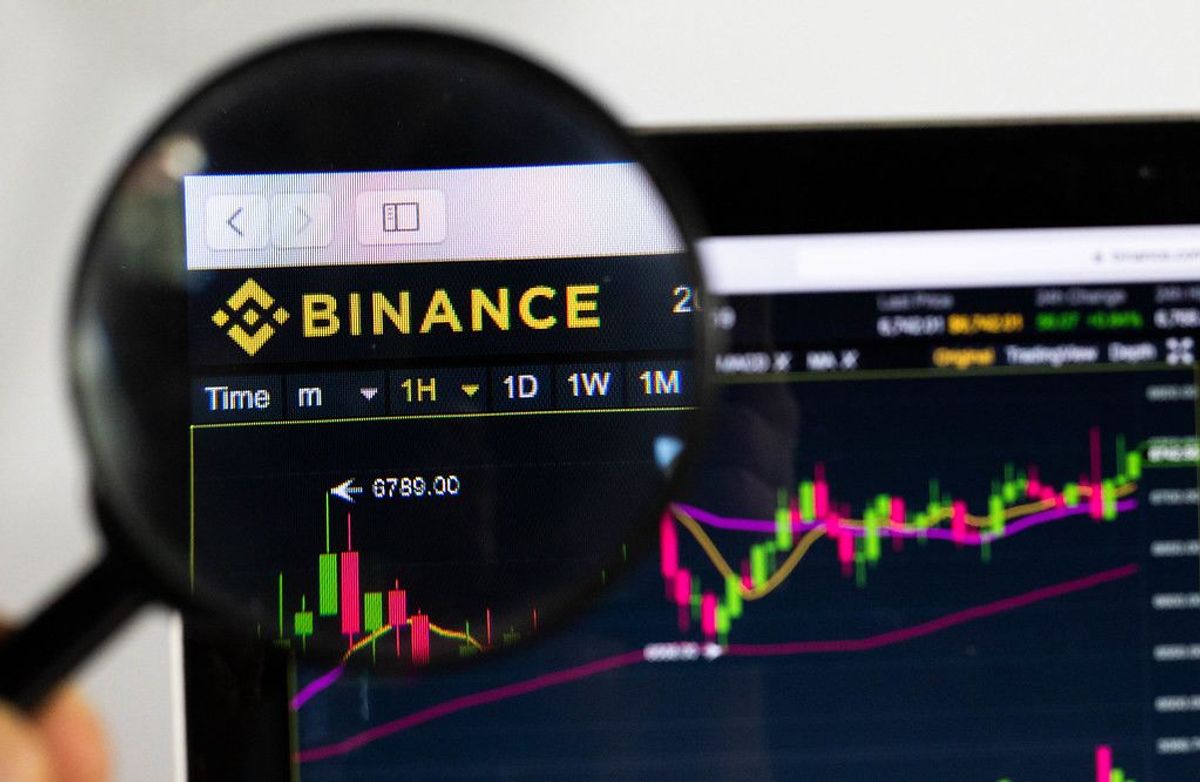
The recent detention of Binance executives, Tigran Gambaryan and Nadeem Anjarwalla, by Nigerian authorities has sparked significant concern and debate within the global cryptocurrency community.
Invited to Nigeria under the guise of a discussion regarding an ongoing dispute, the executives were instead detained, leading to a series of events that have raised questions about the legal and regulatory environment for digital currencies in Nigeria and beyond.
This article delves into the multifaceted implications of this incident, examining its impact on Binance's operations, the allegations of illicit financial activities, and the broader consequences for the future of cryptocurrency in the country.

The specifics of the detention remain under wraps, but it is understood that the executives are being held as part of a broader effort to address the country's forex crisis.The legal framework in Nigeria allows for immediate action in cases of flagrante delicto, where a crime is actively occurring or has just occurred.
Law enforcement is empowered to collect evidence, document the scene, and make arrests if deemed necessary to the investigation.This suggests that the Binance executives may have been apprehended under such circumstances, although official details have not been disclosed.
The situation has raised concerns about the treatment of foreign nationals and the application of Nigerian law in cases involving international businesses.
The arrest of Binance executives has sent ripples through the company's operations in Nigeria, leading to significant disruptions. Binance, which had been operating without official authorization, faced immediate consequences:
These actions have cast uncertainty over the future of Binance's presence in the country and have raised concerns about the broader implications for the cryptocurrency ecosystem in Nigeria.
The detention of Binance's compliance head and Africa manager, following an invitation by Nigerian authorities to discuss disputes, underscores the severity of the situation. The executives' prolonged detention without formal charges has been particularly alarming for the crypto community.
With the Central Bank of Nigeria reporting that Binance moved $26 billion worth of untraceable funds in 2023, the platform's operations have come under intense scrutiny.This has led to a heightened focus on regulatory compliance and the need for clear guidelines to govern the crypto industry within the country.
The global crypto community has been vocal in its response to the detention of Binance executives in Nigeria.Concerns over the precedent this sets for international crypto operations have been echoed across various forums and social media platforms.
Industry stakeholders are advocating for a unified regulatory approach to avoid the pitfalls of isolated and inconsistent policies that could stifle innovation and growth.
The incident has highlighted the delicate balance between regulation and innovation in the rapidly evolving world of cryptocurrency.
Binance, one of the world's leading cryptocurrency exchanges, has been accused of operating without proper authorization in Nigeria.These allegations have raised significant concerns about the legality of its operations and adherence to local financial regulations.
The Nigerian authorities have scrutinized Binance for potentially bypassing the country's stringent financial controls, which are in place to prevent money laundering and other illicit financial activities.
The situation underscores the importance of cryptocurrency exchanges operating within the legal frameworks of the jurisdictions they serve. The lack of authorization could lead to severe repercussions, including fines and operational restrictions.
The implications of these accusations are far-reaching, potentially affecting Binance's ability to offer services in Nigeria and undermining the trust of its users. The company must navigate the complex legal landscape to ensure compliance and restore confidence among stakeholders.
The Nigerian authorities have leveled serious accusations against Binance, suggesting that the cryptocurrency exchange's operations have had a destabilizing effect on the nation's economy.
Binance's activities are alleged to have contributed to the devaluation of the naira, Nigeria's currency, which has seen a significant drop in value. This has raised concerns about the broader impact of unregulated crypto exchanges on national economies.
The situation has put a spotlight on the potential for cryptocurrencies to affect traditional financial systems, especially in countries with vulnerable economies. The following points outline the key concerns raised by the Nigerian authorities:
The case against Binance in Nigeria has brought to light allegations of the exchange's involvement in the transfer of untraceable funds.Witnesses have described a complex network of transactions designed to conceal the origins of significant sums of money.
These funds, reportedly amounting to billions, were shuffled through a series of shell companies, making it difficult for authorities to track their movement and source.The methods employed by Binance are said to include the blending of illicit funds with legitimate business activities, effectively masking their trail.
This practice not only complicates the task of law enforcement agencies but also raises questions about the integrity of financial transactions within the crypto space.The intricate web of financial dealings has sparked concerns over the potential for money laundering and other financial crimes.
The use of cryptocurrency in these transactions adds a layer of anonymity, further complicating the efforts to trace the flow of funds.The implications of these untraceable transfers are far-reaching, affecting not only the reputation of Binance but also the broader cryptocurrency market in Nigeria and potentially beyond.

Following the detention of Binance executives in Nigeria, the government's demands have become a focal point of the ongoing dispute.Reports indicate that Nigerian authorities have made significant financial demands from Binance, with unconfirmed figures circulating in the media suggesting amounts as high as $10 billion.
These demands are purportedly linked to allegations of economic disruption and unauthorized operation within the country.The specifics of the demands remain unclear, but they are believed to center around compensation for the alleged economic impact and a regularization of Binance's operations in Nigeria.
The situation has led to the discontinuation of Binance's Nigerian Naira services amidst increasing government scrutiny. The detention and subsequent demands highlight the complex interplay between cryptocurrency exchanges and national regulatory frameworks.
The case of Binance in Nigeria underscores the challenges that arise when digital currencies intersect with traditional financial systems and regulatory expectations.
The involvement of the Nigerian Parliamentary Committee has introduced a new layer of complexity to the detention of Binance executives.
The committee's role is pivotal in shaping the legislative response to the incident and determining the extent of parliamentary privilege in such cases. The process typically involves a series of steps:
The case of the detained Binance investigators has sparked discussions on the limits of parliamentary privilege and the need for constitutional clarity.Erskine May's definition of parliamentary privilege highlights the unique rights that members of Parliament hold to perform their duties effectively.
However, the current situation has raised questions about the potential misuse of these privileges, especially when it leads to outcomes that could undermine the integrity of the legislative body.
The unfolding events have underscored the urgency for a thorough examination of parliamentary procedures and the safeguards against their abuse. The committee's findings and actions will likely set a precedent for how similar situations are handled in the future.
The international regulatory landscape has been intensifying its scrutiny on Binance, with various agencies raising concerns over the exchange's operations. The U.S. Securities and Exchange Commission (SEC) has been particularly vocal, demanding inspections and questioning the firm's asset custody practices.
Recent court filings reveal the SEC's dissatisfaction with Binance.US's cooperation, as the regulator probes into the exchange's relationship with crypto custody provider Ceffu. The SEC's allegations suggest that Binance.US may not be fully independent from its international counterpart, potentially violating previous agreements.
The SEC's actions reflect a broader trend of increased regulatory attention on cryptocurrency exchanges, as authorities aim to ensure compliance with financial regulations and safeguard against illicit activities.
The detention of Binance executives by Nigerian authorities raises questions about potential violations of international law. International law aims to ensure justice and fairness among nations, but its enforcement can be fraught with challenges, especially in developing countries.
One of the core issues is the lack of resources and capacity, which hampers the ability of nations to enforce legal standards effectively. Additionally, the absence of political will to prioritize international law can lead to outside interests influencing domestic legal decisions, potentially undermining the law's effectiveness.
Cultural and linguistic barriers may also contribute to misinterpretations of international laws, complicating their enforcement. Moreover, developing countries often face imbalances of power and influence, which can skew the enforcement of international law in favor of more powerful nations or organizations.
The ongoing situation with Binance in Nigeria exemplifies the intricate dynamics between national sovereignty and international legal obligations, highlighting the need for a balanced approach that respects both domestic and international frameworks.
The detention of Binance executives has sparked not only regulatory scrutiny but also diplomatic tensions between Nigeria and other nations where Binance operates. Negotiations are underway, with various countries expressing their concerns and seeking a resolution that respects the rights of the detained individuals and the sovereignty of Nigeria.
The delicate balance between enforcing national financial laws and fostering international business relations is at the forefront of these discussions.
The detention of Binance executives in Nigeria sets a significant precedent for crypto exchange operations worldwide.Regulatory actions against major exchanges are becoming more frequent, reflecting a global trend towards stricter oversight of the cryptocurrency industry.
This has implications for how exchanges conduct business and the level of compliance they must adhere to.
The evolving regulatory landscape necessitates that crypto exchanges operate with heightened diligence to avoid legal entanglements and maintain trust with their users. The Nigerian case may influence how governments worldwide approach the regulation and oversight of digital asset exchanges.

The detention of Binance executives by Nigerian authorities has cast a spotlight on the cryptocurrency exchange's impact on Nigeria's foreign exchange crisis.
Binance's operations have been linked to significant untraceable fund transfers, which the Central Bank of Nigeria claims have exacerbated the country's economic challenges.
From a botched currency redesign to the removal of fuel subsidies and a currency float, Nigeria has faced spiraling inflation and a weakening currency.The government's response to the crisis has included a demand for $10 billion from Binance, citing the exchange's contribution to economic disruption.
This has raised concerns about the future of cryptocurrency in a nation that has been one of the fastest adopters of digital assets. The recent lifting of the ban on bank accounts for crypto firms suggests a potential surge in cryptocurrency usage, despite the current tensions.
The situation presents a complex interplay between the need for economic stability and the growing role of digital currencies in Nigeria's economy.
The landscape of Virtual Asset Service Providers (VASPs) in Nigeria is on the brink of significant change. Nigeria's VASP landscape is poised for a harmonious future.With the Central Bank of Nigeria (CBN) taking steps towards regulation, there is a palpable sense of optimism among stakeholders.
The promise of a structured regulatory environment suggests that the days of uncertainty and ad-hoc measures may soon be behind us.The recent developments indicate a move towards a more tailored approach to regulation, which could usher in a new era for Nigerian finance. This shift is expected to bring about a number of benefits:
The anticipation of clear guidelines and policies that are to be implemented post-COVID crisis is creating a cautious yet hopeful atmosphere among the crypto community and investors alike.
The adoption of digital currencies in Nigeria is poised to play a pivotal role in the country's economic landscape. The Central Bank of Nigeria's recent guidelines for banks on digital assets indicate a softening stance towards cryptocurrencies, which could lead to a surge in their usage. This is a significant shift from the previous prohibition, suggesting a more blockchain-friendly environment.
The government's approval of a national blockchain policy aims to transition Nigeria to a digital economy, with the potential to generate employment and promote economic stability. The policy underscores the importance of embracing digital innovation for economic growth.
The effects of digital currency adoption, particularly the eNaira, are expected to be substantially positive for Nigeria's economy, contributing to employment generation and economic stability. As the country navigates through its foreign exchange crisis, digital currencies could offer an alternative means of transaction, reducing reliance on traditional financial systems and fostering a more inclusive economy.
The ongoing detention of Binance investigators by Nigerian authorities underscores a complex and tense relationship between cryptocurrency exchanges and regulatory bodies.
As the Nigerian government grapples with economic challenges and the impact of unregulated crypto activities, the arrest of Tigran Gambaryan and Nadeem Anjarwalla serves as a stark reminder of the regulatory uncertainties that persist in the crypto industry.
The situation raises critical questions about the balance between fostering innovation and ensuring financial stability and legal compliance.The resolution of this case will be closely watched by the international community, as it may set a precedent for how governments engage with and regulate digital asset platforms operating within their jurisdictions.
Gambaryan alleges that during his eight-month detention in Nigeria, which began in February 2024, the Nigerian government engaged in misconduct to scapegoat Binance for the country’s economic woes. He claims that three Nigerian federal lawmakers demanded a $150 million bribe (approximately N225 billion as of mid-February) to be paid in cryptocurrency, an accusation he detailed in a lengthy post on X on February 13, 2025.
He further asserts that the government sought access to Binance’s user data on all Nigerians, aiming to target opposition figures by falsely linking them to the naira’s depreciation. Gambaryan argues this was a distraction from the real cause of the currency’s devaluation—President Bola Tinubu’s monetary policy, which unpegged the naira from the dollar.
Additionally, Gambaryan has accused Nigeria’s National Security Adviser (NSA), Nuhu Ribadu, of prioritizing a “shakedown” of Binance over addressing internal corruption within the government. He contends that Ribadu and other officials used Binance as a convenient scapegoat to deflect from economic scandals and poor policy decisions, rather than investigating allegations of misconduct among Nigerian lawmakers.
Gambaryan also disputes the government’s narrative around his detention, claiming his initial visit to Nigeria in January 2024 was at the invitation of the Nigerian Financial Intelligence Unit (FIU), and that subsequent meetings with officials, including the NSA, SEC, and CBN governor, turned hostile, culminating in a bribe solicitation by House of Representatives members.
The Nigerian government has strongly denied these allegations. On February 14, 2025, the Federal Government, through the Minister of Information and National Orientation, Mohammed Idris, issued a statement dismissing Gambaryan’s claims as “outrageous,” “misleading,” and “defamatory.” The government insists that Gambaryan’s first trip was discretionary and not officially sanctioned, and that his detention was part of a legitimate probe into Binance’s role in manipulating the naira via peer-to-peer platforms.
It further claims that his release on humanitarian grounds, following U.S. diplomatic intervention, yielded benefits for Nigeria, rejecting Binance’s alleged $5 million offer for his freedom in favor of a more advantageous settlement with the U.S. government.
Gambaryan has countered these denials, emphasizing that his treatment—including detention in the notorious Kuje prison, where he suffered health declines requiring crutches due to an untreated herniated disc—was abusive and unjust. He insists that video evidence of his mistreatment supports his account, and he has expressed frustration at the government’s refusal to acknowledge its actions.
His accusations have sparked varied reactions, with some Nigerians on X expressing belief in his story, citing distrust in their government, while others, including political groups like the Accountability Group, have criticized him as dishonest and theatrical, accusing him of tarnishing Nigeria’s image post-release.
On-Chain Media articles are for educational purposes only. We strive to provide accurate and timely information. This information should not be construed as financial advice or an endorsement of any particular cryptocurrency, project, or service. The cryptocurrency market is highly volatile and unpredictable.Before making any investment decisions, you are strongly encouraged to conduct your own independent research and due diligence
Tags :

0 Comments
Show More

A deep dive into recent XRP burn data showing 2.5 million tokens permanently removed over 800 days, why that matters, and why some analysts believe $100 per XRP is inevitable with real numbers.

Ethereum shows renewed bullish momentum above key levels near $3,330.

Bitcoin trades at a critical crossroads as price compresses near resistance. Analysts debate whether BTC breaks $100K or faces another correction.
On-Chain Media is an independent, reader-funded crypto media platform. Kindly consider supporting us with a donation.
bc1qp0a8vw82cs508agere759ant6xqhcfgcjpyghk
0x18d7C63AAD2679CFb0cfE1d104B7f6Ed00A3A050
CBaXXVX7bdAouqg3PciE4HjUXAhsrnFBHQ2dLcNz5hrM
Contains the last 12 releases